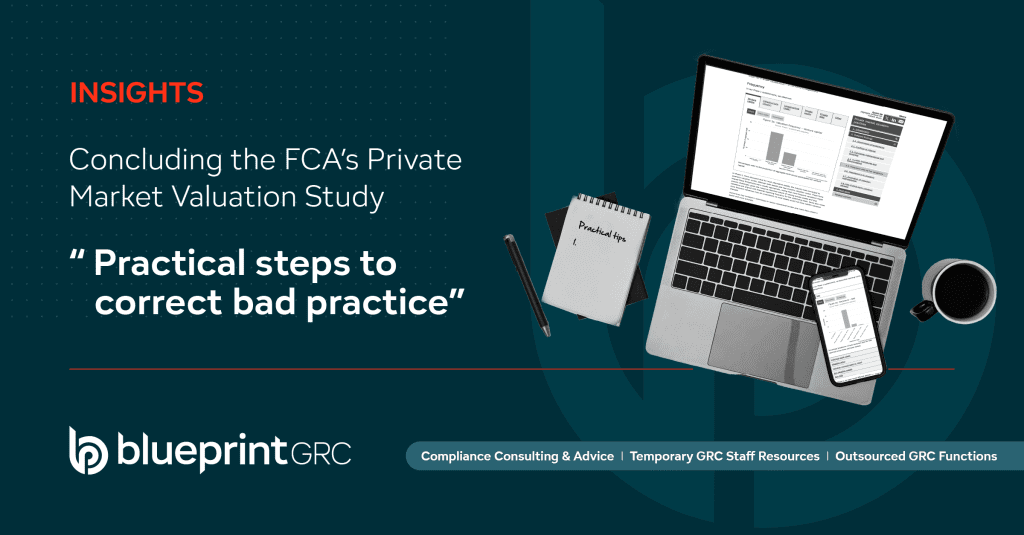The UK continues to be the hub for private market asset management in Europe, something it should be proud of. That moniker brings with it the added attention of the UK Regulator, the Financial Conduct Authority (FCA), which views private markets as central to the UK’s international competitiveness, innovation and growth. As such, the FCA undertook a detailed study into valuation practices in private markets and on 5th March 2025 published its findings.

The multi-firm, multi-stage thematic review of valuation processes included 91 UK regulated firms across venture capital, infrastructure (debt and equity), private equity and private debt. The results of the study were generally positive and the FCA reported being encouraged with good practice in the following key areas.
- Quality of reporting to investors
- Documentation of valuations
- Use of third-party valuation advisers for additional independence and expertise
- Consistent application of established valuation methodologies
The FCA took the view that, generally speaking, firms in the sector had recognised the importance of maintaining robust processes to ensure private assets were being valued with due consideration to risk and investor protection. However, the FCA’s review also identified areas which need improvement. The Blueprint GRC team has focused on those findings and provides a brief summary below, followed with detailed guidance on how firms could learn from the FCA’s comments and implement an improved process and approach to valuations.
Key Concerns
- Better identification and documentation of potential conflicts of interest.
The FCA noted that certain conflicts were only partly identified and documented. These included potential valuation-related conflicts related to investor marketing, secured borrowing, asset transfers, redemptions and subscriptions and uplifts and volatility. The FCA made it clear it expects firms to identify, document and assess all potential and relevant valuation-related conflicts, their materiality and actions needed to mitigate or manage those conflicts.
- Increased independence in valuation processes
The FCA expressed concern that they witnessed differing levels of independence across the pool of 91 firms reviewed. It highlighted the expectation that firms assess whether they have sufficient independence in their valuation functions and the voting membership of their valuation committees to enable and ensure effective control and expert challenge.
- Enhanced processes for ad hoc valuations during market disruption
During periods of market or macroeconomic change, as witnessed in recent years, the FCA emphasised the importance of ad-hoc valuations in managing the risk of stale valuations. This is particularly important in the case of assets having lost value during such a period. The FCA encourages firms to consider the types of events and quantitative thresholds that could trigger ad hoc valuations and document how and when they are to be conducted.
Implications and Next Steps
The publication is a good opportunity for firms to compare their own valuation policies and processes against the observations made by the regulator. A detailed review of the FCA’s conclusions will inform operations and compliance teams on what the FCA considers as good practice and in some cases examples of where firms are exceeding expectations, but the write up also provides clear indication of where their concerns lie and signposts where improvements must be made. Below we provide some insight into how implementation of such improvements may look. We would be delighted to speak with firms who could benefit from our insights, resources and collateral.
Practical steps for improvement!
As discussed above, the FCA’s review identified three key areas requiring improvement in private market valuation practices:
- governance and conflict management,
- independence in valuation processes, and
- ad hoc valuation procedures.
The following are practical steps firms can take to address these issues:
1. Governance & Conflict Management Improvements
Practical steps:
- Develop comprehensive conflict frameworks
Create a valuation framework that captures all valuation related conflicts and potential conflicts. This should also include conflicts which had been mitigated or extinguished and the dates of such.
Based on the FCA’s findings, the list should also include:
- Fee structures tied to asset values
- Asset transfers between funds and continuation vehicles
- NAV-linked borrowing arrangements
- Marketing of unrealised performance
- Implement conflict mitigation protocols
- Use third-party valuation advisers for conflicted transactions
- Establish separate client representation teams for asset transfers
- Conduct periodic market testing of transfer pricing arrangements
- Enforce committee governance
- Maintain detailed meeting minutes showing decision rationale
- Implement escalation procedures for contentious valuations
- Separate compensation structures for valuation committee members
2. Enhancing Valuation Independence
Practical steps:
- Asses the structure of valuation committees
- Ensure majority membership from non-investment professionals
- Implement “four-eyes” validation for key assumptions
- Ensure appointment of sector experts for subjective/contentious valuations
- Strengthen third-party oversight
- Conduct annual independence assessments of valuation advisers
- Use multiple advisers for material assets (>15% NAV)
- Consider disclosing adviser limitations and coverage gaps to investors, appoint experts where necessary
- Implement cross-validation processes
- Use secondary valuation methodologies (DCF + market comps)
- Maintain an audit trail for assumption/computational adjustments or ad-hoc valuations
- Conduct quarterly back testing against realised exits
3. Ad Hoc Valuation System Implementation
Practical steps:
- Establish clear triggers
| Threshold Type | Examples |
| Market | 20% move in comparable multiples |
| Fund-Level | 10% NAV deviation from internal tracking |
| Asset-Specific Economic | M&A events, covenant breaches Create clear triggers and understand the impact of interest rate shifts and inflationary pressure |
- Develop formal procedures
- Create standardised templates for event-driven valuations
- Implement escalation process for trigger events
- Conduct investor briefings within 30 business days of material adjustments
- Integration with the governing body
- Include ad hoc valuation authority in the valuation committee terms of reference
- Consider implementing stress test exercises using historical crises
- Automate/ Streamline trigger monitoring
We believe firms should prioritise a detailed review of the FCA’s findings against their own policies and procedures and our recommendations. Indeed, the FCA states this directly in the recently published Dear CEO letter to the Asset Management and Alternative segments (see here for Blueprint’s insights on that letter)._Such a project will necessitate buy-in and collaboration across front and back-office teams, with your service providers, independent specialists and ultimately regular investor engagement. Due to the nature of private assets, and in the absence of price discovery via frequent trading in liquid-alternative markets, private market participants are required to work harder and delve deeper when valuing their assets and justifying that to investors and regulators.
Not following these recommendations or ignoring insufficient expertise, focus, or poorly managed conflicts of interest, heightens the risk of inappropriately or maliciously mis-valuing private assets, which can increase the risk of harm to investors and UK market integrity. As stated in the aforementioned Dear CEO letter, the FCA will commence thematic reviews in this space in 2025 – so one must ensure all homework is complete!
If any of the issues discussed above resonate with you, please feel free to contact us to discuss, we’d be delighted to help.



